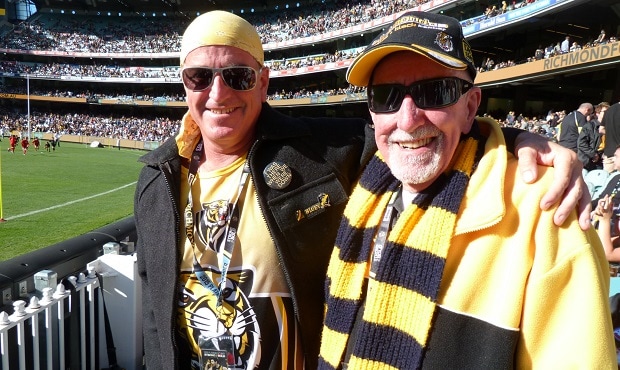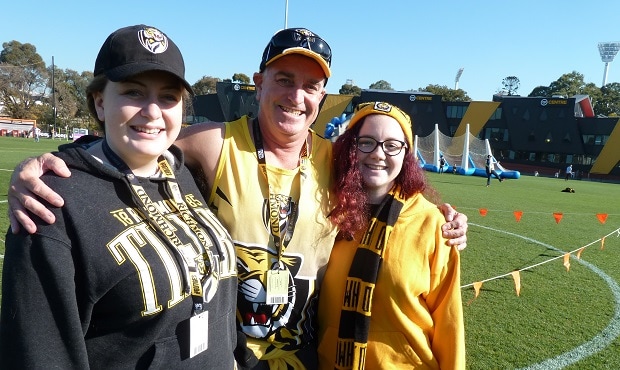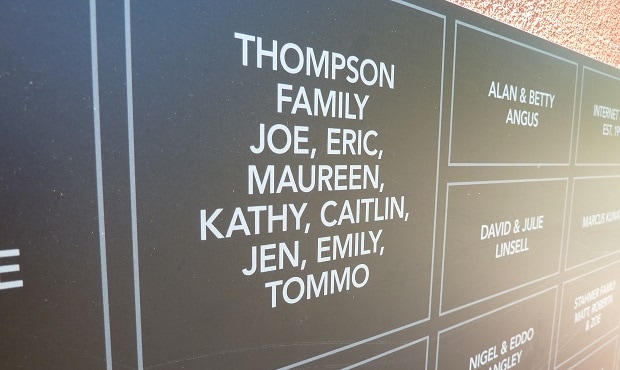Goodbye – to a fan, to one of us
Eric Thompson was a barracker. The son of a father who was born in Richmond, he stood as a boy on the Punt Road Oval terraces, catching glimpses of his Saturday matinee idols; Jack Dyer, ‘Max’ Oppy, and the best he saw, ‘Mopsy’ Fraser (“hands as big as a meat hooks, he’d look after the little blokes”), and life was never the same again. He saw Richmond through thick and thin. All the suburban grounds, wooden seats in the outer, a club member for 71-years, he never asked for anything in return, hoping only for lifelong memories.
His last game, last month, the loss to Fremantle after the siren, and there he was, an old boy in the crowd, among those he loved, beaten but not bowed.
“He didn’t want a wheelchair, didn’t want his walker,” says his son, Paul, there with him at the end. “He wanted to walk in and walk out. He wanted to see it all one last time.”
After years of failing health, Eric Thompson died last week. He was 84. His family and friends gather this Wednesday in his honour at a chapel in Sale, in regional Victoria, to offer last goodbyes. He didn’t want a fuss at his funeral. Didn’t want fanfare. And that is how it is. He will leave this world quietly, in box, and as was his wish, wearing Richmond footy socks and a yellow and black scarf knitted long ago by his wife.
**
Alan ‘Butch’ Killigrew, the former St Kilda footballer best known for his fire and brimstone oratory when coaching the Saints in the late 1950s, asked philosophical questions about the game and what it might mean.
“After all, what is a football club?” he once asked.
“It is the grass in the middle, posts at the ends, and bricks and mortar. It’s people that give it soul. A football club is a living body.”
As it is at Richmond, a club with a history deeper and richer than most, where if ghosts could talk they’d tell stories of Captain Blood and the hard knuckle boys of old Struggletown, the match factory workers turned Saturday afternoon heroes, all those country lads, from Nathalia, St Arnaud, Mildura, Wycheproof, Albury, Avoca, Ararat, Ouyen, Robinvale, Merbein, Lalbert, Bendigo, Tatyoon, from Tempe-Gorya-Patchewollock, from everywhere, flying like angels in the big city – the back-pocket plumber, the policemen, the interstate recruits from Tasmania to Melville Island, the prodigal sons, wayward spirits, shooting stars, all coming to Tigerland to join in the glorious pursuit of a game.
And part of that living body is and was and always will be, the crowd.
Born in the winter of 1932, a Richmond premiership year (defeating Carlton), in the maw of the Great Depression, the story of Eric Thompson’s life and death, of his 71-years of paid-up barracking, is a story about Richmond that could be about us all. It connects with those who eye-witnessed Royce Hart floating across packs for a mark (“he was a match-winner, he lifted a game”). It shares with any who remember 1950s ruckman Roy Wright, “a big, tall bugger”, who won two Brownlows and had hands the size of dinner plates (“I saw him come back from the bar with five pots in one hand”). It includes those who journeyed to all Melbourne’s suburban stadiums (“Victoria Park, it was a frightening ground”), who were there at VFL Park when Dunstall kicked 17 against us, who turned-up through the lean years, who marvelled at ‘Richo’ and the Gale and Kellaway brothers, and Wayne Campbell and Matty Knights, as our club clawed its way back. It’s a story that entwines all who’ve stood or sat in the outer, whose heart skips a beat when the yellow and black run onto the ground, when our boys have their tails up, the wind at their backs, romping over whatever stands in our way.
The story of Eric Thompson is a story of fortitude, survival, loyalty, but one also of forgiveness and acceptance. Most of all, his story is one of belonging.
“Football is a great leveller,” he had told me.
“You could be standing next to a lady in a fur coat, or a tradesman, or a company director and it didn’t matter. When you’re barracking and you’re at the ground, you’re all on the one level. You all have one thing in mind, and that’s to gee your team up to help them win.”
**

Father and son: Eric at the game with his hand-knitted scarf and his son, Paul (Saturday May 2, 2015)
Eric’s son, Paul, texted news of his father’s faltering health. He was in Kenya, where he works on a mine site, about to make the dash home. A friend picked him up from Melbourne Airport. They drove to Sale, straight to the hospital. He had four hours by his father’s bedside, four hours to farewell.
Before the game last Saturday, I met with Paul outside Punt Road Oval to talk about his father, who I’d met twice. Once was at a game, Richmond playing the Swans. The other time, I sat down with him to hear his Richmond story. Older fans like him, they’ve got things to say that might be instructive, inspiring, make us grateful, or simply understand. They are living connections to ideas and emotions that have touched us all.
My tape recorder running, Eric told of his father, Joe Thompson, posted to the Middle East with the Australian Ninth Division during WWII, redeployed to New Guinea to fight the Japanese, who in mid-1946 returned to Melbourne, where the first thing he did was take his son to the football. “I was 14 years old and we went to Punt Road Oval,” said Eric. “We picked up bluestone blocks so we could stand on them to see over the crowd.”
Last Saturday, Paul had left Sale at 7.20am, catching a bus to Melbourne to be at Yarra Park, meeting his two daughters, Caitlin, 21, and Emily, 19, both studying and living in town, both Richmond fans. All three were going to the game together.
“Dad loved his footy, he loved Richmond,” says Paul. “Even the paddock footy, he used to go watch Sale City. But he loved the Tigers through and through.”
Among the elms, Paul shared some of his father’s football stories. Buying roasted snacks from the peanut sellers; at the game with his transistor radio to his ear; sweet-talking his way into the Richmond rooms before the 1974 Grand Final, through Charlie Callander, the club’s long-time property steward and committeeman. A life story as told through the weekly rhythms of home-and-away games, it ended with a heartbreak after-the-siren loss, but also with thanks for all the game has given.
“He enjoyed that day, he enjoyed the footy, enjoyed our comeback, and he enjoyed that Freo didn’t give-up either,” says Paul. “He watched quietly, but jumped out of his seat when we hit the front.”
“It was a long drive home together talking about that final minute.”

Spiritual home: Paul and his two girls, Caitlin (L) and Emily (R) on the green grass of Punt Road Oval before the game last Saturday.
It was a last game that completed a circle. Eric was there with Paul, and Paul’s eldest daughter, and a gathering of friends and their grown-up children, about a dozen in total – and with the spirit always of Kathryn, his daughter who died of bone cancer in 1990, aged 25. “She was an avid supporter,” Eric had told me when we met. “She loved going to the football. She was in the cheer squad, was as keen about Richmond as what we were.”
This was Eric’s football family, says Paul, who talks of the game in a continuum, linking generations, and families and cultures and divides, bringing them all to the ground as one.
“We spent a lot of time together at the footy. He’d roll his army blanket out on the wooden seats, and we’d have lunch in the social rooms before the game – rissoles, coleslaw and chips – and watch the twos play beforehand, and go back to the club after games.”
He says his father had a special spot for Aboriginal footballers, and said often that if they had a team of their own they’d run rings around the rest. “Dad remembers Syd Jackson and Polly Farmer, he remembers them all coming through, he picked Micky O’Loughlin at about game two and said, ‘this kid’s gonna be a star, you watch him’. He loved Maurice Rioli, and Longy, he loved watching them play, he said they could make the ball dance.”
He says Eric was heartened by the ways Richmond had embraced the Indigenous community, its footballers, and by the resounding success of the new women’s football league, which he enjoyed watching on television.
“He was dirty Richmond didn’t get one of the first licenses to run a team in the competition,” says Paul.
“But he died knowing we were going for one.”
**
Eric John Thompson, a fitter and turner by trade, was a blue-collar Richmond barracker. He’d seen every Richmond player from the days of Jack Dyer to Dan Rioli and Shai Bolton, picking-out their attributes of each, how they could contribute to the team, the sum of its parts making a bigger whole.
An ordinary fan, he had seen some extraordinary things on the football field. He knew of all the highs and lows the game can bestow, and all those seasons in-between.
“My kids were born into the Richmond heydays,” he told me when we first met.
“They were brought up on Richmond success and the expectation of finals football. We seemed to queue up for finals tickets at Punt Road every year.”
Now a critical juncture in another season of our lives, a game against our old foe, those bluebloods from the higher ground, with all their sense of entitlement, believing they might be better, that their destiny comes before ours. Eric Thompson would have loved it! He would have been there, casting his eye over the ground, over the young men wearing our colours, knowing anything might happen, knowing all men and women are equal before the bounce of the ball.
Paul says his father could see good things in this team, he could see the makings of something we all might remember.

Richmond benefactors: the Thompson family plaque on the Jack Dyer Foundation Wall of Honour, an ongoing memory of support at Punt Road.
Last Saturday afternoon, at quarter time, I thought of Paul at the game with his daughters, with the empty seat where his father would sit, a first game without Eric, sun on their faces, in row P, bay M15, a half-forward flank when Richmond kick to the Punt Road end, and what it all might mean. Faces in the crowd. Richmond people. Proud and passionate.
The game is a burden and a gift. It is history and memory, past and present, it is a common link that connects the lives of so many. Eric Thompson is no longer with us in voice, but he’s always there in spirit, in memory, in story; he’s always at the game, cheering, barracking, belonging; always in our colours, with a bloodline in Richmond, his lungs sore, his heart now not so strong, but always striving for that one last chance, that golden afternoon in the sun.
This is the place where he rests.
Eric is survived by his wife of 60 years (and knitter of Richmond scarves), Maureen; by Paul, his wife Jenni, and their two daughters.
dugaldjellie@gmail.com



